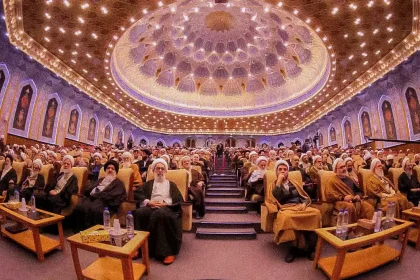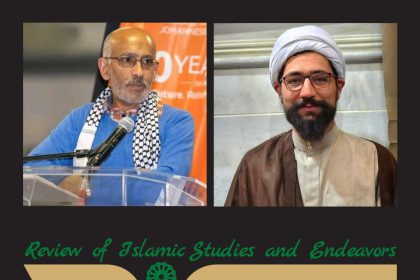Introduction
Orientalism is one of the most significant phenomena in the history of scholarly inquiry over the past two centuries. Emerging from Europe, it developed with the aim of studying the languages, cultures, and religions of the East, with Islam in particular becoming one of its primary fields of research. Closely tied to the dynamics of Orientalism and Colonialism, the outcome of these endeavors was the production of an extensive body of studies, translations, critical editions, and analytical works that profoundly shaped the image of Islam in the Western world and influenced the trajectory of Islamic studies. This image extended beyond the geographic West and exerted considerable influence on academic circles worldwide.
Nevertheless, engagement with Orientalism cannot be limited to praise and appreciation of its scholarly contributions. The motivations behind Orientalist studies were diverse and complex. A significant portion of these works was deeply affected by political and colonial ambitions, resulting in partial or even distorted representations of Islam. At the same time, another strand of Orientalist scholarship was shaped by religious and cultural objectives, often aimed at influencing the cultural foundations of Muslim societies. Thus, Orientalism consistently presents a dual dimension of both “opportunity” and “challenge.” This reality makes it necessary to approach Orientalist scholarship with a critical perspective—recognizing its contributions while also acknowledging its limitations and biases—in order to develop a selective and evaluative engagement with this intellectual legacy.
The Origins and Motivations of Orientalism
The “Orient” is a multidimensional and heterogeneous concept that, throughout history, has taken on shifting meanings and references depending on Western intellectual contexts and perceptions. Geographically, it has sometimes been restricted to the Near East and, at other times, has encompassed the entire Asian continent and even parts of North Africa. Culturally and civilizationally, the Orient has been represented as a diverse whole of civilizations, religious traditions, languages, and intellectual systems, often defined in contrast or opposition to the “West.” Historically, the concept has come to signify not only a geographical or cultural reality but also a reflection of Western mental and discursive structures in the process of perceiving and representing the Eastern “Other.”
Eastern studies or Orientalism[1] emerged within a specific historical context. One of the central concerns of Orientalism was the study of Islam and its interactions, as much of the geographic Orient was shaped by this great civilization. The earliest European attempts to study Islam can be traced back to the two-hundred-year Crusades (1095–1291 CE), though scattered efforts existed even earlier through figures such as Constantine the African. Christian clerics and missionaries, in their confrontation with Muslims, felt compelled to acquaint themselves with Islamic texts. It was for this reason that the earliest translations of the Qurʾān into European languages emerged in the medieval period, such as the Latin translation by Robert of Ketton around 1143, commissioned by Peter the Venerable. At this stage, the motivations were primarily religious and missionary in nature.
As Europeans became acquainted with the profound scientific achievements of Muslim scholars, and with the advent of the Renaissance and subsequently the Enlightenment, Orientalism acquired a more scholarly character. A growing fascination with ancient languages and civilizations encouraged European researchers to study Arabic, Persian, and Turkish more deeply. They came to realize that understanding the history of human civilization and the roots of Western culture required engagement with Islam and its intellectual and philosophical heritage.
Over the past 150 years alone, approximately 60,000 books and, between 1906 and 1991, around 750,000 Orientalist articles have been published. Yet Orientalist activity was not confined to the writing of books, articles, and encyclopedias. It took many forms: the establishment of institutes for Islamic studies and academic chairs, the creation of publishing houses for Eastern works, the organization of international Orientalist congresses, missionary endeavors and Christian proselytization, archaeological discoveries, and the founding of Orientalist museums.
Political and colonial motivations, however, were present from the very outset of the movement. Colonial powers such as Britain and France recognized that detailed knowledge of Muslim societies and cultures could serve as an invaluable tool for exercising control and managing their colonies. Napoleon’s invasion of Egypt in 1798 is often seen as a turning point in this regard. Consequently, Orientalists were not merely academic researchers but also political advisors to colonial governments. Many of their studies were directly or indirectly aligned with imperial objectives. The growth of Orientalism was consistently intertwined with the expansion of colonialism, just as its religious dimension was closely linked to missionary activity—both serving as evidence of these enduring associations.
After World War II, with the onset of decolonization, Orientalist scholarship underwent certain changes. While political motivations persisted, there was also a shift toward more objective and scholarly approaches to Islam and Muslim societies. Regional or area studies gained prominence, and new fields within Islamic studies began to attract greater attention.
Positive Contributions of Orientalist Studies
A) Preservation and Dissemination of the Islamic Heritage
Regardless of the diverse motivations behind Orientalist scholarship, these efforts produced certain positive outcomes. One of the most significant contributions of Orientalists was the collection and publication of Islamic manuscripts. During the eighteenth and nineteenth centuries, European scholars gathered thousands of manuscripts from libraries in cities such as Cairo, Istanbul, Damascus, and Baghdad. Many of these texts might not have survived or been accessible to us today had they remained in their original conditions.
Another notable achievement was the publication of the Qurʾān and Ḥadīth literature. Theodor Nöldeke, the German Orientalist, in his well-known work Geschichte des Qorans (History of the Qurʾān), attempted to examine the chronology of revelation and compilation of the Qurʾān. Although his conclusions have been subject to serious critique, his methodology set a model for subsequent Western scholarship. Similarly, Ignaz Goldziher, the Hungarian Orientalist, conducted research on ḥadīth, tracing the origins of many narrations to the social and political developments of early Islam. While Muslim scholars rejected his interpretation, his work nonetheless brought sustained scholarly attention to ḥadīth studies in later periods.
B) Advancement of Linguistics and Comparative Literature
Orientalists played a central role in the development of modern linguistics. Their studies on Arabic grammar and morphology, the comparative study of Semitic languages, and the examination of loanwords in European languages laid the groundwork for what later became comparative philology.
In addition, Persian, Turkish, and Urdu literatures entered the European academic sphere largely through the efforts of Orientalists. Edward FitzGerald’s nineteenth-century translation of Rubā‘iyyāt of Khayyām is a striking example of this cultural impact, introducing Western readers to a new dimension of Persian poetry.
C) The Introduction of Islamic Philosophy and Mysticism to the West
Orientalists also played a major role in introducing Islamic philosophy and mysticism to the Western world. The works of Ibn Sīnā (Avicenna), al-Fārābī, Ibn Rushd (Averroes), and Ibn ʿArabī were translated into European languages and had a profound influence on Western philosophers and intellectuals. Louis Massignon, the French Orientalist, was among the most prominent figures whose extensive research on Manṣūr al-Ḥallāj paved the way for a deeper understanding of Islamic mysticism in the West.
Scholarly studies of Islamic philosophy, especially on Ibn Sīnā and al-Fārābī, not only highlighted the sophistication of their intellectual systems but also clarified their connections to Greek and Christian philosophical traditions. In the contemporary period, Dimitri Gutas has continued this line of inquiry in works such as Greek Philosophers in the Arabic Tradition and Philosophy, Theology and Mysticism in Medieval Islam, exploring the interactions between Eastern and Western philosophical traditions.
D) New Perspectives on Islamic Culture and Civilization
Orientalist scholarship also contributed to the development of new perspectives on Islamic culture and civilization, alongside remarkable Western archaeological discoveries. These studies brought attention to dimensions of the intellectual and artistic heritage of Muslims that had often been overlooked in traditional scholarship, even within the Islamic world itself, and offered fresh interpretations.
For instance, Orientalist research in Islamic art and architecture—such as the studies of Otto Demus and Ernst Kühnel—revealed new aspects of stylistics and aesthetics that Muslim scholars had rarely addressed in a systematic manner. Furthermore, detailed investigations in the field of historical Arabic linguistics and the textual development of the Qurʾān, despite certain controversial orientations, opened new avenues of scholarly dialogue and expanded linguistic studies among Muslim researchers.
Thus, it can be acknowledged that Western scholarship, notwithstanding its critical and political dimensions, generated intellectual openings and raised fundamental questions about the nature and potential of Islamic culture and civilization.
Limitations and Critiques
A) The Link between Orientalism and Colonialism
One of the central critiques of Orientalism is its close connection with colonial projects. In many cases, Orientalists provided their knowledge and expertise to colonial governments. For instance, Britain relied on Orientalists’ knowledge of local cultures and languages in governing India. In Egypt, the presence of French Orientalists during Napoleon’s campaign exemplifies the fusion of scholarship with colonial ambitions. More broadly, many Orientalists—such as Louis Massignon, Antoine-Isaac Silvestre de Sacy, Edward Browne, Bernard Lewis, and Alfred Guillaume—served as diplomats or officials in their respective governments, directly illustrating the interdependence of academic and political interests.
B) Biased and Reductionist Perspectives
Many Orientalists approached Islam not as a living, spiritual religion but merely as an object of historical or sociological inquiry. In his ḥadīth studies, for example, Ignaz Goldziher attributed little to no role to revelation or to the religious experience of Muslims. He interpreted ḥadīth primarily as products of political and social conflicts, disregarding their sacred dimension. While such approaches generated abundant historical data, they simultaneously produced partial and one-sided portrayals of Islam, neglecting the foundational premises accepted by Muslims and thereby offering representations of Islamic sciences that are biased and unreliable. Orientalist scholarship was not always accompanied by a deep understanding of Islamic sciences or Muslim lived realities. Rather, it often focused on identifying and exploiting gaps in Islamic scholarship.
C) The Reproduction of Negative Stereotypes
A further limitation of Orientalist studies is the reproduction of negative stereotypes about Islam and Muslims. Because many of these studies failed to engage with Islamic teachings as understood by Muslims themselves, they contributed to enduring stereotypes—portraying Islam as violent, irrational, or regressive. Such representations, rooted in Orientalist literature, later served to justify colonial policies and, in modern times, have fueled Islamophobia.
The negative outcomes of these intellectual dynamics, combined with the hegemony of colonial power and its domination over educational systems in colonized countries, often led to the ascendancy of Western Orientalist discourse and Eurocentrism in academic discussions. In some cases, this influence extended so far that Muslims themselves began to view their own history and culture through Western lenses, resulting in a kind of cultural self-diminishment.
The Importance of a Critical Approach to Orientalism
A) Distinguishing Method from Outcome
What is crucial in engaging with Orientalism is to distinguish between “method” and “result.” Many of the scholarly methods employed by Orientalists—such as precision in manuscript studies, linguistic approaches, and historical analysis—remain valuable and usable. However, the neglect of complementary methodologies often led to serious errors in their conclusions, undermining the reliability of the results.
B) Critical Re-reading of the Orientalist Legacy
From the late twentieth century onward, a wave of internal critique of Orientalism emerged. Edward Said’s seminal book Orientalism marked a turning point in this regard. Said demonstrated that Orientalism was less an objective science than a power-laden discourse that defined the East in relation to Western interests. His work compelled both Muslim and non-Muslim scholars to reconsider and re-examine Orientalist studies.
C) The Necessity of Producing Indigenous Islamic Knowledge
Contemporary Muslim scholars face the necessity of producing and consolidating an indigenous, independent academic discourse while selectively employing Western critical and scientific methodologies. Such a truth-oriented, systematic discourse would creatively integrate the internal, faith-based perspective of Muslims with rigorous, critical scholarly approaches. Historical experience has shown that neglecting this integration has often led to the repetition of the same assumptions and methodological errors of classical Orientalists. Thus, only through the creative interaction of faith and critical reason can a balanced, comprehensive, and methodologically sound account of Islam be presented—one that is both faithful to the internal realities of the Islamic tradition and responsive to contemporary academic standards.
Orientalist Studies and the Future of Islamic Scholarship
In today’s world, Orientalist scholarship continues to be influential. Prestigious Western universities still maintain chairs in Islamic studies, and Orientalist works remain part of the academic canon. For Muslim scholars, this situation represents both opportunity and threat.
It is an opportunity because of the vast body of sources and data that has been produced: access to manuscripts, translated texts, and historical studies. Yet it is also a threat, as many of these works are still framed within external, biased perspectives that perpetuate negative stereotypes.
The way forward lies in fostering fair and substantive dialogue between Muslim and non-Muslim scholars. Only through such engagement can scholarly methods be applied effectively while also recognizing the lived faith and spiritual experience of Muslims.
Final Reflections on Evaluating Orientalism
Orientalism is a multifaceted phenomenon. On the one hand, it has provided immense scholarly and cultural contributions to the study of Islam and its heritage—from collecting and editing manuscripts to introducing Islamic philosophy and mysticism to the world. On the other hand, it has been entangled with colonial agendas and has frequently produced partial or negative portrayals of Islam.
Muslim engagement with Orientalist studies requires a deep and fundamental recognition of their own religious and cultural identity. Only with such intellectual self-awareness can the scholarly legacy of the West be evaluated fairly and accurately. This engagement must neither dismiss Orientalism’s positive achievements nor accept its findings uncritically. Instead, it calls for a balanced and critical examination of Orientalist works. Within this framework, understanding the diverse motivations—religious, political, and academic—underpinning Orientalist scholarship plays a vital role in uncovering both its hidden and explicit dimensions. Similarly, familiarity with the research methods and analytical tools of Orientalists is essential for developing an informed and reasoned response.
Accordingly, drawing upon the positive contributions of Orientalism—such as the preservation of texts, the advancement of research methodologies, and the systematization of historical and linguistic studies—can offer valuable opportunities for the Islamic world, provided that a critical awareness is simultaneously maintained regarding its pitfalls, such as the propagation of doubts, methodological distortions, or cultural Westernization.
Thus, meaningful engagement with Orientalism will only be achieved when, both intellectually and methodologically, a balance is struck between utilizing its strengths and avoiding its pitfalls. A critical perspective enables us to distinguish between “opportunity” and “challenge.” Combining scholarly methods with critical evaluation of biased judgments offers a pathway toward producing independent and indigenous knowledge of Islam. The future of Islamic studies depends on precisely this integrative vision: merging the internal experience of Muslims with scientific methods in the framework of fair and equal dialogue.
[1] Despite the similarity of these two terms, there is a fundamental difference between them. Therefore, since the 29th International Congress of Orientalists (1973), the term Orientalism rather than Eastern studies has been officially recognized.








